#Post-modern literature
Text
henry jekyll 🤝 victor frankenstein
fucking around and finding out
#im ending this whole whis a better mad scientist discussion with tgis simple post#fuck around and find out#jekyll and hyde#gothic literature#the strange case of dr jekyll and mr hyde#my rambles#gothic lit#edward hyde#dr jekyll and mr hyde#henry jekyll#victor frankenstein#frankenstein#the modern prometheus
448 notes
·
View notes
Text
just got to chapter 5 in my frankenstein reread oh my god. i fucking love and cackle at the fact that henry is just like “omg victor ^_^ i’m so happy to be here to study with you at university finally after three years apart !!” and victor just stares at him with huge autism eyes shaking and malnourished like “i fucked up. big.”
#more of moth#frankenstein#the modern prometheus#victor frankenstein#henry clerval#clervalstein#cause to me this is gay#swoop in and save your boyfriend who fucked himself over unsupervised#gothic literature#goth lit#gothic lit#frankenstein weekly#to me this is an insanely funny post okay
666 notes
·
View notes
Text
Once you start looking, you see queer presentism everywhere. It pops up when politicians espouse our “unprecedented” ability to love who we love, and when recent book bans are said to “roll back the clock” on LGBTQ+ rights, implying that clocks tick continually toward progress. It manifests in Oscar Wilde hagiography, which elevates him to the status of singular queer martyr and extrapolates an epochal paradigm from his 1895 trials. It seeps into our everyday speech, in our references to “forbidden love” and our use of the term “Victorian” to imply prudish homophobia. It both stems from and structures the editorial projects that publishers pursue, giving rise to catalogues like the NYRB Classics, where the oldest work tagged LGBTQ+ is Colette’s The Pure and the Impure (1932) — as if nothing queer was written before.
The truth is that there’s a world of queer writing that predates Colette, volumes of manuscript and books that aren’t so much products of historical suppression as they are suppressed by today’s “it’s gotten better” mindset. This is convenient for a culture industry in search of the sui generis and always eager to pat itself on the back for its own enlightenment. But the almost total neglect, outside the academy, of the queer literary archive is a shame, and not only because it propagates factual errors. In limiting our horizons for understanding how our predecessors lived, loved, and wrote, we end up narrowing our own vistas. When we apply the repressive hypothesis, we’re actually repressing ourselves.
Colton Valentine, “Against Queer Presentism | How the Book World Neglects the Archive,” The Drift, October 25, 2022.
#reading#this probably gives the wrong impression of the piece itself which does a lot of really interesting work critiquing modern queer literature#as failing to understand the historical existence of lgbt people BUT these two paragraphs seem like the easiest to isolate and I really like#the work they are doing!!!!! sorry Colton valentine I love the whole piece. maybe I’ll make another post
3K notes
·
View notes
Text
Mr. Darcy in a nutshell:
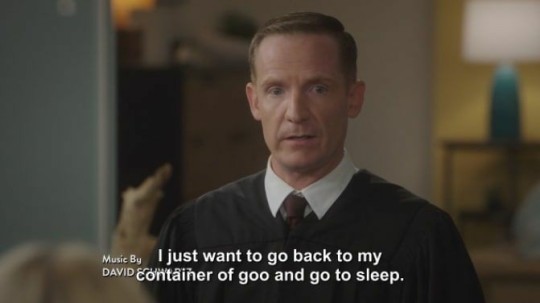
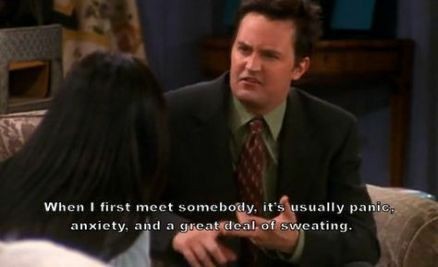

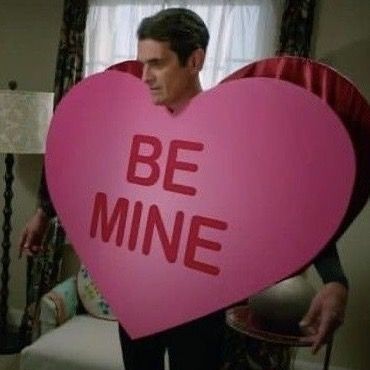
#nymphpens#dark academia#poets on tumblr#dead poets society#relatable#tumblr text post#classic literature#jane austen#pride and prejudice#the good place#friends#arrested development#modern family#mr darcy#in a nutshell#classic literature memes#literature memes#Elizabeth bennet#memes
157 notes
·
View notes
Text




Forough Farrokhzad poetry for today
#persian literature#persian poetry#iranian cinema#modern poetry#forough farrokhzad#mahmoud darwish#foreign languages#poetry by women#poems by women#writers of color#web weaving#text post#contemporary literature#litblr#contemporary poetry#sylvia plath#joan didion#virginia woolf#farsi
83 notes
·
View notes
Text
Really love that Arthur is the Once and Future King because we imortalize him. We keep bringing him back through our stories.
#just storytelling as a path to imortality#arthur pendragon#arthuriana#arthurian legend#arthurian literature#vulgate cycle#le morte d'arthur#post-vulgate cycle#heather dale#bbc merlin#camelot musical#there are so many modern arthuriana stories i cannot possibly list them all#monty pyton and the holy grail#avalon#the once and future king#the pendragon cycle#arthurian saga#mine
337 notes
·
View notes
Text
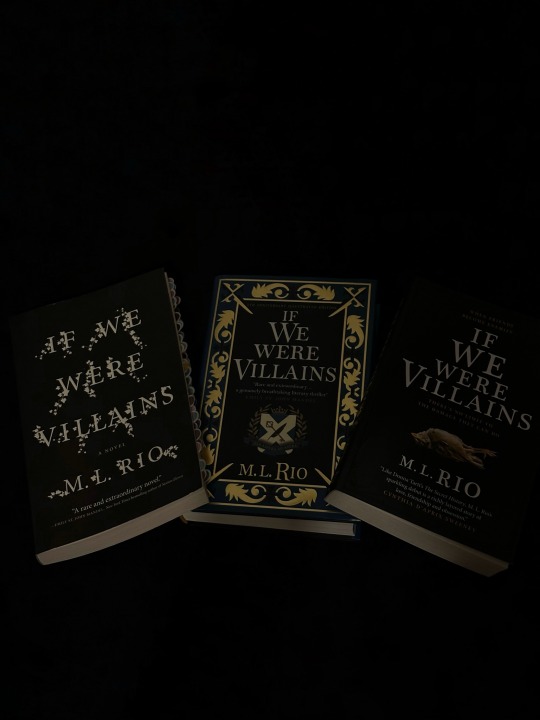



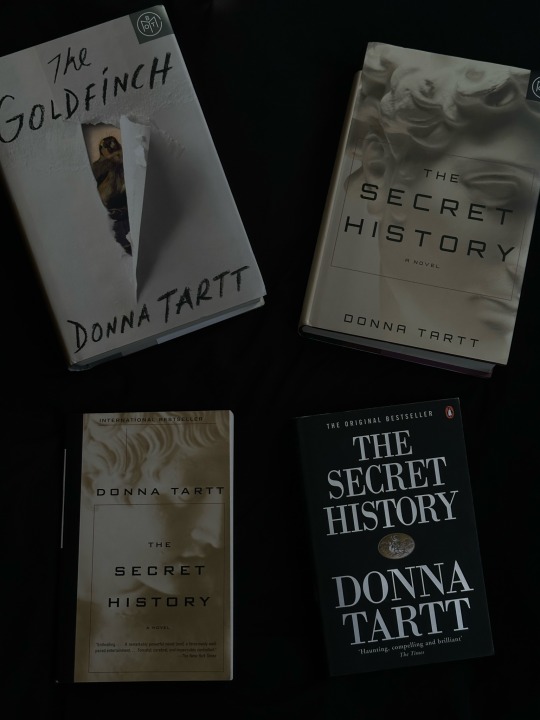

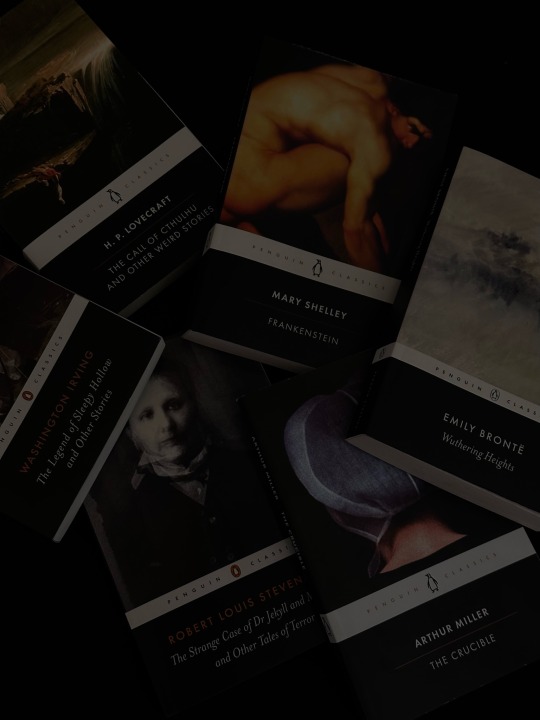

Luxury, passion, chaos, and books.
#new post#boost!#reader#literature#lit#lgbt+ and poc friendly#dark academia books#dark academia#dark literature#diversity#books and reading#currently reading#classic books#modern classics#black tumblr#book blog#booklr
100 notes
·
View notes
Text
A little rant about MBC My Dearest, purity and men who weaponise it:
(Trigger warning: sexual assault, rape as a war crime)
Fusion sageuk or not, this world has some set rules around purity, even in the relatively loosey-goosey Neuggeunri, where women and men can and do commingle, chat and meet in groups. The last barbarian invasion hangs over them; the old ladies in Gil-chae’s hometown tell the girls that death is better than allowing the barbarians to touch you and that if they do, you should kill yourself for the sake of said purity. Death is preferable to lost purity in this time/place; that’s firmly established from the beginning of the show. (It’s reinforced midway when Injo’s court reports of women who jumped off cliffs into the sea at Ganghwa rather than be taken by barbarians, no doubt perceived not as an avoidance of pain and torture, but a praiseworthy act designed to retain and restore purity).
Gil-chae and Eun-ae have to grapple with this when Eun-ae is attacked by a barbarian. Eun-ae was violated and felt violated by what happened. They know what they are supposed to do, what the old ladies told them to do; and yet Gil-chae holds Eun-ae close and says, nothing happened. We were hurt and our clothes were torn because we rolled down a mountain. Nothing happened to us. She rewrote that story, in the face of everything that said Eun-ae didn’t deserve to live anymore. Consummate survival requires rewriting stories, even the ones that are the hardest to paper over.
Because it appears again in Hanyang, in relative peacetime, when Eun-ae feels she cannot accept Yeon-jun’s proposal, because even if Gil-chae rewrote that story, it’s harder to reconfigure shame when it’s under the skin, when it’s attached to the thing that makes you valuable as a woman. Yeon-jun may never know what it took for his future wife to survive, and that ignorance too, is a privilege. But Eun-ae knows, and perceives her value differently now than before. It’s Gil-chae who persuades her again, who reminds her that they rewrote this story together, two women who survived against all odds.
In this postwar, still somewhat vulnerable time, the possibility is high that there are assault survivors around, just as there are women who may have had to sell their bodies to feed their families, or broken any number of rules around purity for survival. It’s foreseeable that women survivors have been through or seen unimaginable things happen to other women, to their friends and have experienced it themselves. I’m not saying this to undersell the general trauma of war on men - just to say that war crimes hurt women in a very different, very intensely long-lasting way* as compared to theatres of war and fighting.
All of this to say: it didn’t take Jang Hyeon very long to go from “you’re not as pure as you think you are for loving a taken man” a few episodes ago to “you couldn’t live without a man for a day? If you were going to give it away you might as well come to me at least once.” I am truly horrified that he pretty much gets away with it; Gil-chae moves with the punch and gets in a hit of her own, but that’s a bone-chilling thing to tell a woman, any woman. It would be a terrible thing to say to a woman now, let alone in a time when that mattered so much to women, let alone in a time and place where it was forcibly taken from so many women, many of whom died so it wouldn’t be.
This callous attitude continues later when she’s run away with him and they’re in a room for the night. She tentatively asks about marriage, saying that it would be hard for her, since she’s almost a married woman, and people would consider her “used”. (Her fiancé later tells Yeon-jun that he is permitted to kill his partner and the adulterous lover, so this isn’t a gossip without consequence.) In essence, Gil-chae put her life on the line for a man who still says “Husband, no. I am your servant and my body is yours”, a promise that carries little substantive meaning in their world. Marriage isn’t a luxury good that she’s asking for as a whim. It’s what protects Gil-chae and her family from harm; it’s what will allow her sister to find a suitable match later on.)
Jang Hyeon is shown from the start as a man of his own ideas, someone who who doesn’t truck with traditional Joseon morality. He can and does reinvent rules for himself, and clearly doesn’t think that much of notions of purity, but he’s fine using them against Gil-chae.
Yes, Jang Hyeon saved her life during the war, but Jang Hyeon also had the choice of participating or not, the luxury of stepping back if he so chose. Gil-chae had no such luxury, no such choice, an open target on the run. He no doubt understands that the barbarians are raping women, that to survive as a woman is fraught, that sex has become fraught. To use purity to attack a woman he claims to love, to reduce her momentarily the way those old women did - to express his anger by lashing out in this way, in a way calculated to hurt, to violently pierce at the foundation of what it means to be a woman in this time and place is a cruelty that is hard to countenance. It’s telling that his anger at her leads him there, that it escalated with all that time, because he knows that’s what hurts. He knows it’s valuable, knows it hurts when he strikes at it, and yet will do little to protect it for her. I don’t know if there’s any amount of growth that will change this, whether it’s something he can change at all.
There are many upsetting things about this episode, but Gil-chae’s choice to stay at the end is the least upsetting part of it, and the most conceivable, intelligent choice she could have made in the face of a man who - in her perspective - can only offer her fervent words and a feverish gaze, things that will not feed her family or protect her reputation, her business or her heart.
#*there is literature out there on this topic#in case anyone wants to read about rape as a war crime#but i wanted to put that in context#as well as his statements#okay off to daydream about the modern au fixit#mbc my dearest#my dearest#eta: the term should be rape as a weapon of war#although it is also a war crime#as more recent definitions of it go#gin text posts
90 notes
·
View notes
Text
Aimé Césaire saying that colonization works to decivilize the colonizer truly lives in my head rent-free
#this is the essence of the v problematic anticolonial critique in so much 19thc literature (eg heart of darkness) right?#(and also its more modern inheritors eg apocalypse now and the Doing An Imperialism Makes Our Soldiers Sad genre of war story)#it glosses right over the crucial 'systems of rapacious cruelty are bad IN THEIR OWN RIGHT BECAUSE BROWN PEOPLE ARE HUMAN' bit#but in that one limited sense - that cruelty also brutalizes the perpetrators - it is very much the same critique#anyway i guess my brain continues to find ways to circle back round to discourse on colonialism no matter the initial topic#lit tag#no more war#imperialism#imperial violence always comes home#cultures of dissociation#aimé césaire#i am also choosing to tag this#sherlock holmes#as like solidly 98% of the stories in which the murderer is a former colonial officer or official are ROILING w this exact anxiety#(especially the hella racist ones. lol.)#i mean loads of authors in that time period are doing it but i have a tag for acd so.#my posts
63 notes
·
View notes
Text


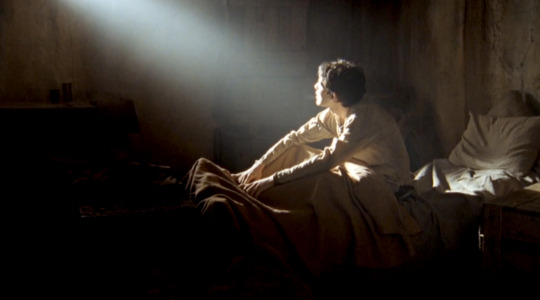
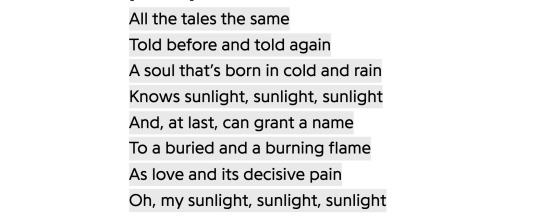



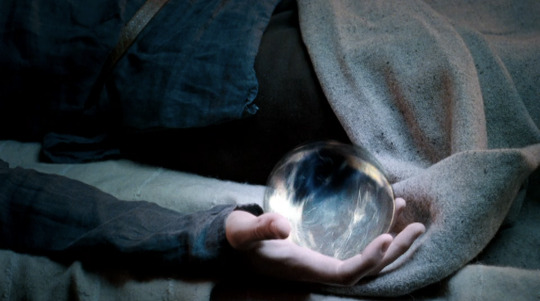

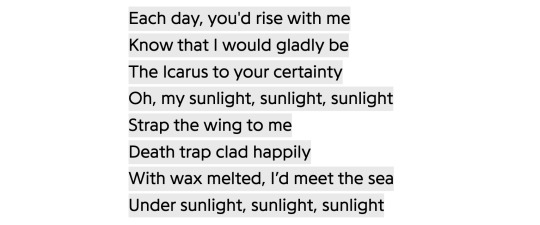
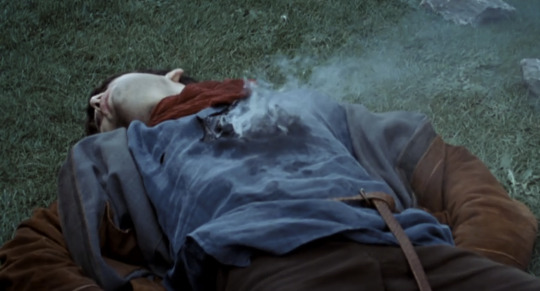
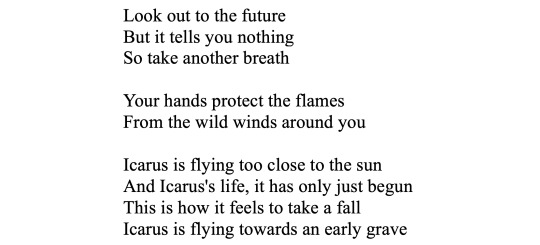
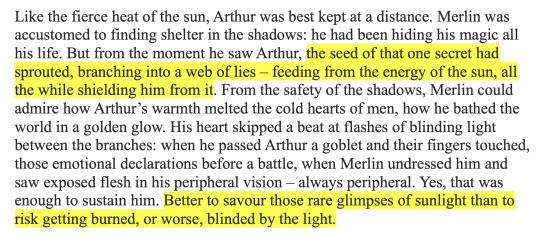
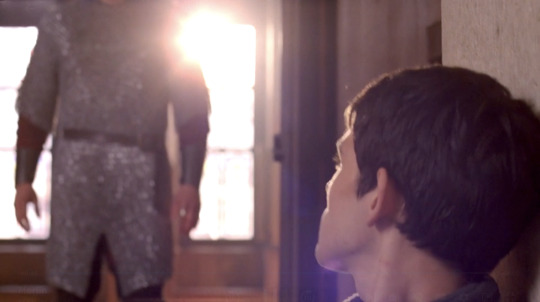
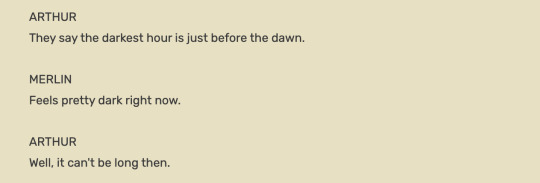

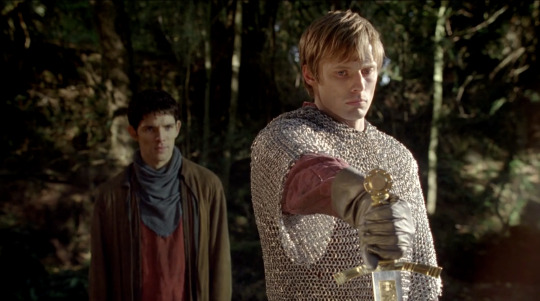

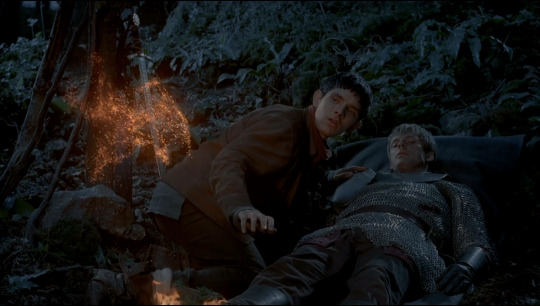

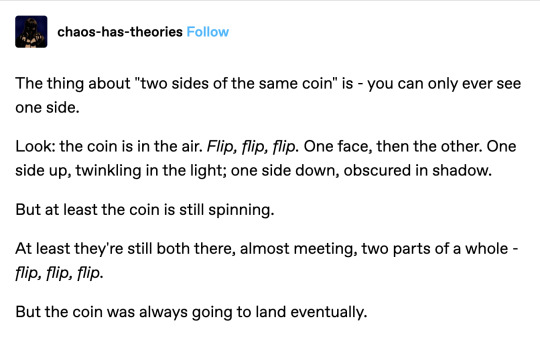





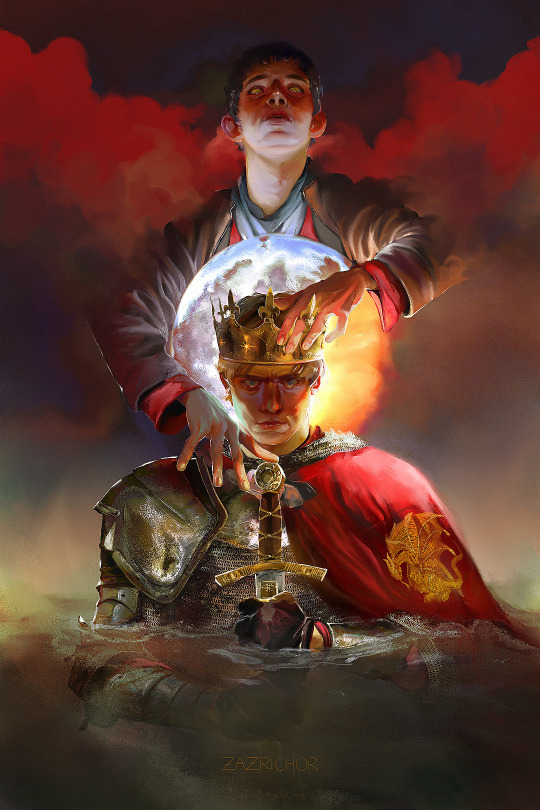
I shine only with the light you gave me
The Moon Will Sing - The Crane Wives /// BBC Merlin, The Mark of Nimueh (1x03) /// BBC Merlin, The Dragon's Call (1x01) /// Sunlight - Hozier /// Alban Arthan - Grove of Nova Scotia Druids /// Shall I Compare Thee to a Summer's Day? - William Shakespeare (lines 1-4) /// Moon Song - Phoebe Bridgers /// BBC Merlin, The Poison Chalice (1x04) /// Sunlight - Hozier /// BBC Merlin, Le Morte D'Arthur (1x13) /// Icarus - Bastille /// Stolen Kisses, Borrowed Time - sexy_sorcerer_sapphic /// BBC Merlin, The Wicked Day (4x03) /// BBC Merlin, The Darkest Hour part 1 (4x01) /// Mirrorball - Taylor Swift /// BBC Merlin, The Sword in the Stone part 2 (4x13) /// Shall I Compare Thee to a Summer's Day? - William Shakespeare (lines 5-8) /// BBC Merlin, The Diamond of the Day part 2 (5x13) /// the thing about "two sides of the same coin" - @chaos-has-theories /// My Love Mine All Mine - Mitski /// Winter Solstice at Stonehenge - Getty Images /// Shall I Compare Thee to a Summer's Day? - William Shakespeare (lines 9-14) /// BBC Merlin, The Diamond of the Day part 2 (5x13) /// rises the moon - Liana Flores /// Once and Future - @zazrichor
#very pretentious of me but hnnng I'm having thoughts !#I'm aware that I'm slightly misinterpreting Shakespeare's sonnet shhh don't come for me literature nerds#also yes I'm including my own fic. it's self referential. it's post-modern.#bbc merlin#merlin#merthur#web weaving#web weave
97 notes
·
View notes
Text
I want nothing. I want nothing. I want nothing while i go and grope on the memory, but i scream that i don't want to make a home. Shame should crawl underneath my skin, shouldn't it? It doesn't. I do that alchemy to myself
— muffinsincoffin, "a wolf talk with me"
#poets on tumblr#text post#poetry#dark acamedia#literature#modern literature#poem#quotes#dark acadamia aesthetic#dark academia#a wolf talk with me
26 notes
·
View notes
Text
It's still so weird when I see people hand wringing about comparisons of fanfiction to early modern literature, usually with the assumption that the people making the comparisons only read fanfic or they'd know that there's some special quality to early modern writers re-purposing pre-existing stories, themes, and characters that fanfic doesn't have.
But it's glaring that despite all the theatrics and how daaaaares and "read real literature" etc, it's not really possible to define what that quality is.
Early modern literature is not automatically good just because it's old. As in any era, plenty of it sucks! So it's not just "well, fanfic is bad/mediocre and early modern literature is definitionally brilliant and that's what makes them different." It's not that early modern literature comes from an era of unhindered artistry or some nonsense like that. At least for English writers, it was in fact an era of heavy censorship, and opportunities for writing the kind of literature under discussion were sharply restricted by who got access to education and patronage.
Now, those kinds of concerns do make the creative process for early modern English literature different from the far fewer restrictions on writing fanfic. The trends are (sometimes) different and the goals are often different. I don't think they're actually the same thing. But I do think fans are 100% right to point out that the modern obsession with originality, novelty, and copyright is not some absolute standard for all kinds of writing and can't even be consistently applied to works considered literary given how wildly ahistorical it is for things like early modern literature.
If you're going to argue that there is some intrinsic quality about fanfic that makes it Just Worse by definition—and especially if you're going to grandstand and sneer at people about it—then you should be able to define what that is. And it is fair to point out that this concept that originality of plot, theme, and character are intrinsically better, more creative, and even sometimes a defining quality of literature cannot account for things like early modern literature and don't make any sense in many contexts.
#honestly i think people just see red at the idea of fanfic being even remotely comparable to ~great literature#and then make shitty arguments about things they don't know very much about#like ... 'witty' snide one liners circling around social media are not actually cogent arguments#anghraine rants#fanfiction#renaissance blogging#(my outdated early modern tag)#anghraine babbles#long post
93 notes
·
View notes
Text
once a boy told me humanity never lived. Humanity died everytime Prometheus did
#prometheus#greek literature#greek gods#dark acadamia quotes#dark academia#dark academism#literature quotes#light acamedia#poetry#poem#literature#text post#text#modern literature#literary#lit#classic literature#classic#museums
92 notes
·
View notes
Text
Elizabeth Bennett:
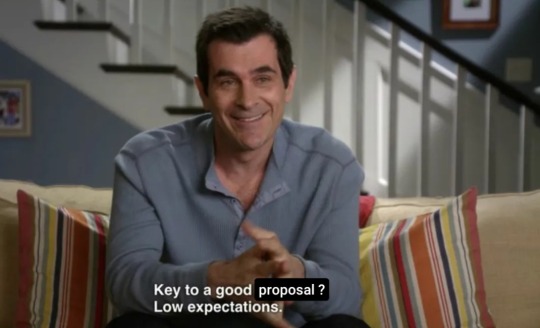
#nymphpens#dark academia#poets on tumblr#dead poets society#relatable#tumblr text post#classic literature#jane austen#lit memes#classic literature memes#pride and prejudice#pride and prejudice memes#elizabeth bennett#mr darcy#mr collins#excellent boiled potatoes#memes#literature memes#modern family x classic literature#modern family#modern family memes#modern family x pride and prejudice#lit meme#classic lit memes#humour
31 notes
·
View notes
Text
KinitoPET, Doki Doki Literature Club, Pony Island, and The Beginner's Guide: Some Autistic Gamer Thoughts
This is gonna be a long post and not exactly my usual kind of post but I hope some people like it anyways and are able to read the whole thing. I'm kinda just infodumping some thoughts but still.
I really like all of these game. I really like them. And I sort of relate to them in an unexpected way that I think most of them (with the exception of The Beginner's Guide) did not intend.
I think the link between the first two is easiest to explain so I'll start there.
KinitoPET and DDLC are both games about computer program, who has a singular, hard-coded purpose, becoming sentient and taking that purpose to an extreme. And similarly, they both harbor no actual malice as characters. And that's what I find so compelling. Kinito just wants to be the perfect best friend, and as a computer program, all he knows is gathering data, so that's the means by which he tries to do it. He doesn't fully understand what it is to be human. He doesn't have a grasp of free will, especially because he doesn't really have free will the way humans do, even though he's sentient. He's a computer program. He has a singular purpose. So he uses that purpose as a means to the end of being your best friend, which to him, means trapping you in a world he made just for you, using all the information you gave him. Computer programs don't die. They don't have a concept of "eternity" or "eternal torment." To him, "forever" is just a length of time.
And most of the same things can be said of Monika. She was designed to be a character in a dating sim. The singular purpose of dating sim characters is to fall in love with the player. That's what they do. So she does it, and she does it the very best she can. Of course, being sentient means that she can think outside the box. She wants to be the one you fall in love with and she uses her ability to manipulate her world and the people in it to try and make that happen. At their core, both of these character harbor no malice whatsoever. They don't want to hurt you, they don't hate you, it's the opposite. They love you, they just don't understand human love.
Think about these ideas led me to Pony Island, which once again has that same idea. An Entity(tm) in a computer wants to trap you in/at the computer forever. Only in this case it's The Actual Devil who wants you to playtest his silly pony game forever. The main difference being that The Devil does, in fact, have an understanding of human concepts like eternity and torment. In fact those concepts are kind of His Jam. He is the primary symbol used to convey those ideas. But even still, he never seems to show much malice for the player outside of situations where the player is actively breaking and manipulating the game and subverting his goals. And honestly I can understand that. If I gave my game to someone to playtest it and they refused to play it the way I'd intended, I would not be happy with them. Now, The Devil KNOWS that what he is doing is morally evil. Trapping souls in Gamer Purgatory and all. But in a way I feel like that's not so different from Kinito and Monika. Evil and eternity and torment are the only things he knows. Is that his fault? We have no way of knowing for certain that The Devil has ANY agency over his narrative. We don't know that he knows any other way to live(?) outside of trapping souls and tormenting them and all that jazz. In fact if you really wanna get meta with it in this game that's already a metagame about game development (which is a phrase that describes most, if not all, of Daniel Mullins' games), we can say for certain that The Devil DOES NOT have any agency, because he is a game character designed specifically to be...well...The Devil. He's evil and torments people eternally. That's what a The Devil does. He is NOT self-aware. If he were and he had a choice, maybe he'd just put pony island on itch.io and try to get feedback lol.
All of these games, at their core, are about a character that desperately wants some kind of human connection, but doesn't fully understand how to get that, and in turn makes the human they reach out to feel trapped and uncomfortable.
Do you know what game also does that? The Beginner's Guide.
Even thought it's a massive leap in form from the aforementioned examples, The Beginner's Guide has that same core concept. It's a game about games, in which someone doesn't understand how to be human.
When I first played The Beginner's Guide I totally missed the point. I thought it was just a game about games, and I thought the Davey walking us through it was The Real Devey and Coda was A Real Person who made weird games. I totally bought into the narratives that Davey was telling us the whole time instead of actually thinking for myself. I'm older now, though.
This at-least-somewhat-fictionalized version of Davey is the socially awkward weirdo. Coda is Just Some Guy who likes to make creative games. He's not A Developer(tm), he's a guy with a hobby. The Beginner's Guide is about Davey and how he sees himself in Coda's games but thinks that what he sees is Coda. And Davey never once talks to Coda about anything other than his games. Davey never once mentions having an actual, real conversation with this person that he's coming to consider a friend. Davey is a well-meaning but misguided person, and in some of his games, Coda is actively trying to tell Davey that in his own way. I think a good line that represents this is "If someone had just told me he just likes making prison games..." because it shows how Davey never even asked. There's countless examples of this. Like when Davey says Coda was "weirdly happy all the time" during a specific time period. He doesn't know why. Maybe Coda got a new job he's excited about, or a romantic partner, or maybe he started taking antidepressants, but the point is that Davey doesn't know, and he never asks Coda directly. He just makes wild assumptions about Coda by playing his games.
The Beginner's Guide is about someone who doesn't know how to socialize and is unaware of it. Someone who doesn't know how to foster a relationship with a human, and tries his best, but whose attempts are seen as uncomfortable. When you interpret some of Coda's games through this lens you can see it more clearly. That game about being on a stage in front of someone you admire, that's Davey talking to Coda and Being Weird(tm). And then, when he feels weird, he doesn't actually talk to Coda at all. He recedes back, feeling trapped and distant from someone he wants to be around. Observing only from a distance, through a bunch of prison bars.
Seems familiar.
Of course I could be pulling a Davey by forcing my own interpretation of the game onto you. And so the cycle continues. I encourage you to consider your own interpretation if you haven't ruined by mine, unable to see it any other way (whoops, there's Davey again).
To me, these games are about autism. I am an autistic woman, so of course that's the lens through which I see things. You don't have to be autistic to be socially awkward or misunderstand people. Again, you can have your own interpretation.
But I've felt these things. Being distant from someone, wanting to foster a relationship but not realizing that what it means to foster a relationship is sometimes entirely different from what I think it means. What "a relationship" even is can be totally different from what you expect. And I've been on both sides of this dynamic. Being approached by someone who Comes Off A Bit Too Strong or Too Weird or just Different. And I'm patient with those people. I know what it's like. I know they've been through it with less patient people, or people who only pretend to foster that connection out of pity or some other misguided attempt to make someone feel better. Obviously a relationship founded on pity and one-sided affection is doomed from the start. And in most of these games that "one side" is the other side of your computer screen.
Communicate with your friends, your partners, your family, whatever. If they don't know how to love you right, it's up to you to help them. If they're not receptive to that, that's when the responsibility is on them, at that point they knew the risks, and if they don't respect your boundaries you cut them off. If you don't know how to love someone else, it's up to you to ask them. Nobody wants to be Kinito, or Monika, or The Devil, or Davey, and nobody wants to be their players, either. Be patient with each other, and talk about it.
#original post#serious post#essay post#gaming#modern gaming#daniel mullins#daniel mullins games#pony island#kinitopet#kinito#the beginner's guide#davey wreden#ddlc#doki doki literature club#ddlc monika#games about games#metagames#meta games#autism#actually autistic#digital horror games#digital horror#internet horror#internet horror games#webcore horror#if you made it to the end of this post please send me an ask or a DM I'd really like to know what you thought of it
19 notes
·
View notes
Text

take a shot everytime i draw this sad tortured pathetic man with lighting bolt behind him.
#i hope you like this pathetic soggy bag of potatoes <3#victor frankenstein#frankenstein#frankenstein or the modern prometheus#mary shelley’s frankenstein#gothic literature#gothic lit#goth lit#frankenstein weekly#mad scientist#do i post art once in two month?#yes#do i call my blog an art blog despite that?#also yes#that’s why my name is as it is#artists on tumblr
166 notes
·
View notes